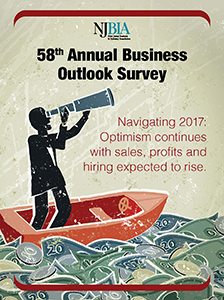
2017 Business Outlook Survey
Navigating 2017: Business optimism continues, with sales, profits and hiring expected to rise. However, members face challenges as they look ahead.
On Dec 7, 2016Executive Summary
NJBIA’s 58th annual Business Outlook Survey tells a vivid story about the state of New Jersey’s economic climate. There are many positives to report as our members tell us they are broadly optimistic about their own businesses heading into 2017. They expect hiring, sales, profits and wages all to rise. (See Figure 1 and Figure 8) In short, they feel good about themselves and are planning for a great 2017. Despite this optimism, our members still report that they remain concerned about New Jersey’s overall economic future.
Members recognize that, led by NJBIA, we have been able to make strides in beginning the process of comprehensive tax reform with the elimination of the estate tax and increase of the retirement income tax exclusion. But there is also the continued recognition that when it comes to taxes, we still have a long way to go in order to be competitive with other states.
Leading the list of specific concerns is the cost of health insurance, property taxes and the overall cost of doing business; once again their three top concerns. Further, more than two-thirds say a $15 minimum wage will impact their business. They also anticipate that the state’s economy will be challenging in the first six months of 2017.
In contrast, we continue to positively outpace other states in two critically important areas – the quality of our workforce and the quality of our public schools. However, these positives could be in jeopardy if we don’t reduce the state’s cost of living, including our high tax burden and the cost of housing. These factors make New Jersey unaffordable, particularly for Millennials. As a result, we have seen our young people leave the state in higher numbers than any other demographic group. If we cannot keep them here, we will not have the workforce necessary to fill the available positions we anticipate.
Our members also told us again this year that they will not retire here and that they take the estate and inheritance taxes into account when making business decisions. This survey was completed before the final tax reform bill was signed into law in October, which eliminates the estate tax by January 2018 and raises the retirement income tax threshold significantly over the next few years. As a result of these actions, we are hopeful this trend will begin to reverse.
The latest IRS figures that now include 2014-2015, tell us that during the last 11 years we have lost $20.7 billion of net adjusted gross income. The loss of these funds resulted in a loss of $13.1 billion in economic output; nearly 87,000 jobs; and $4.6 billion in total lost labor income.
In 2017, NJBIA will continue to press for more comprehensive tax reform. We must harness the momentum and continue to focus on making New Jersey more affordable for all.
Click here to download a PDF of the 2017 Business Outlook Survey.
Related Articles:







